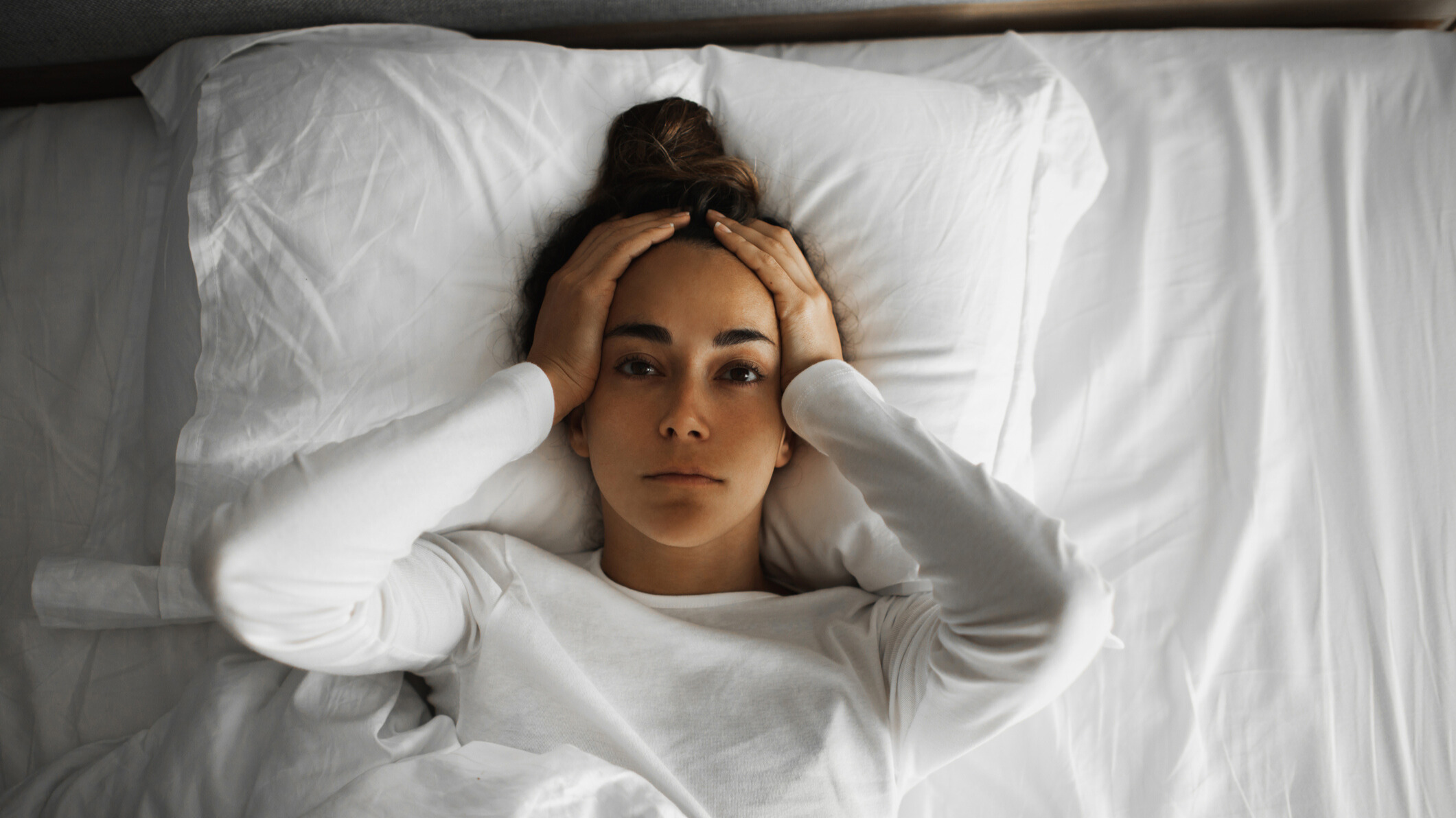Why do I keep waking up in the middle of the night? An insomnia expert answers
I used to sleep through the night, but recently I've been waking up hourly from 3am

Sleep has always been a part of my day that I really look forward to. For me, there's nothing quite like hitting the hay after a whole day of managing work, responsibilities and life in general. I used to sleep through the night too with no issues.
You can imagine then, how frustrated I've been lately to find myself wide awake at 3am, then 4am, and finding it difficult to go back to sleep. It came to a point for me where I had to figure out why this sudden big change in my sleep was happening.
Dr Lindsay Browning is a leading sleep expert, chartered psychologist and founder of Trouble Sleeping (a sleep issues clinic) who helps treat people with insomnia and other sleep disorders. I told her my story, and this is what she suggested...

Dr Lindsay Browning is a chartered psychologist, neuroscientist, and founder of Trouble Sleeping, a leading sleep disorders clinic. Dr Browning is also the author of Navigating Sleeplessness, which explains how you can sleep deeper and better for longer.
Waking up at 3am: My story
I'm someone who sleeps between seven and a half to eight hours each day. Not getting enough sleep makes me tired the next morning and I end up feeling exhausted as the day goes on. I generally go to bed and try to wake up roughly the same time every day, so I'm pretty good at sticking to my schedule.
Like most people, over the years I’ve had my fair share of random 3am or 4am wake-ups. However these past couple of weeks, I've been wide awake after a bad dream every night from around 3am to 5am. The first few times I brushed it off, thinking it might be a new environment (I recently moved). But the fact that I kept waking up, night after night, was bothering me.
More annoying was how it was difficult to go back to sleep and instead feeling wide awake; my brain already active and thinking about the next day or, even worse, triggering my anxiety. I tend to stay awake for 20 minutes to over an hour some days, making checklists in my head about everything I have to do in the coming days and weeks.

Why do I keep waking up in the middle of the night?
I explained my situation to Dr Browning, who took some notes about my sleep pattern and my 3am wake-ups. She then walked me through how our sleep cycles work, what affects our sleep, and how we can manage it all.
Get instant access to breaking news, the hottest reviews, great deals and helpful tips.
“Although between sleep cycles it is completely normal to briefly wake or stir, in periods of stress or when we are in pain or unwell, these awakenings may be a little longer so that we realize we've woken up,” explains Dr Browning.
Our sleep cycle has three main parts: light sleep, deep sleep, and Rapid Eye Movement (REM) sleep. Each stage of sleep is equally as important. While one whole cycle can last around to 90 to 110 minutes in adults, studies show that we spend about 25% in REM sleep— the stage where we dream more and sleep less deeply.
“If you have a consistent bedtime then it's likely that, if you do wake up enough between your sleep cycles, this may be at a fairly consistent time in the middle of the night. Also, there may be regular sounds in the night such as the heating kicking in that wakes us at the same time each night.”
But there's a big clue as to what is happening with me, and Dr Browning spot's it straight away: “What's happening with you is that you're waking up after a disturbing dream and staying awake.
"It's probably something to do with your recent move and new environment as sleep is when you process new things and emotions,” she adds. Dreams may also create scenarios for the future when you go through a change, positive or negative, as a way for our brain to prepare us for struggles that we might face.
- Read more: Sedentary jobs increase your risk of insomnia with symptoms lasting up to 10 years, new study says.
The 5 most common causes of waking in the middle of the night
1. Sleep environment
It would take some time to mentally process a new sleep environment or sudden changes in life. The room temperature (too hot or too cold), noises, or an uncomfortable mattress can wake you up in the middle of the night. Setting the ideal temperature and investing in the best mattress for your body and sleeping position is crucial to prevent discomfort.
2. Underlying sleep disorder
Waking up multiple times during the night could also be a sign of disrupted or poor quality sleep, which is often caused by a medical sleep issue such as obstructive sleep apnea or restless leg syndrome.
“In fact, a person with obstructive sleep apnea may wake up multiple times during the night without even realizing it (because they go back to sleep again so soon after waking), but this constant disruption can cause significant daytime fatigue the next day." Say Dr Browning.
"If someone has insomnia, they are often more anxious, especially about the need to sleep well, and that increased anxiety can make waking up in the night more common.”

3. Hormonal shifts
Hormonal changes, such as during pregnancy, perimenopause and menopause, can also significantly affect your sleep. “Hormonal imbalance because of menopause can cause women to wake up due to hot flashes or night sweats,” added the doctor. This is because progesterone and estrogen levels fluctuate during the different stages of a woman’s life which impacts the sleep quality too.
4. Stress and anxiety
When the body is stressed or is troubled by anxious thoughts, your cortisol and adrenaline levels increase as you innately sense a danger. This can let you sleep later than usual (sleep latency) or cause disruptions. “Worrying too much on getting the right amount of sleep can also cause stress, snowballing into insomnia if you continue to focus too much of your attention on it,” said Dr Browning.
5. Lifestyle habits
Poor sleep hygiene, smoking, consuming caffeine too close to bedtime or drinking too much alcohol can all make you wake in the middle of the night. Eating too much sugar or food items with high glycemic index has also been linked to sleep issues.
How to stay asleep all night
While seven to nine hours of sleep is recommended for most healthy adults, not everyone needs the same amount. It's also important to understand that no-one actually sleeps through the night – we all wake up briefly, but some of us remember these wake-ups more vividly. In fact, some sleep experts believe waking up at night was considered a normal sleep habit of our ancestors.
However, if you find yourself constantly waking up in the middle of the night and then stay awake for hours, here are some things to help you sleep longer and avoid insomnia:
1. Stop looking at your phone
According to Dr Browning, this is my biggest mistake. “If you check the time when you wake up, it tends to just make you increasingly anxious and frustrated about how little you have slept or how much time is left until morning. Also, you may see messages or emails that are either anxiety producing or lead you to start responding to them, waking you up even further,” she says.
Exposing yourself to the bright light from your phone screen also suppresses the production of melatonin (the sleepy hormone) production.

2. Relax before bed
Once you wake up, your mind may tend to become too active bombarding you with racing thoughts and plans for the next day. The first thing to do is to take deep slow breaths to induce a sense of calm.
You can then take up any relaxation techniques like the simple counting backwards from 1000, 4-7-8 or the 5-4-3-1 method. “The trick is to use any cognitive distraction technique to slowly fall back into sleep,” says Dr Browning.
3. Get out of bed if you can't sleep
If you find yourself struggling to fall back asleep and feel like you’ve been awake for a while, don’t force it. Staying in bed will just make you feel more frustrated, in turn making it harder for you to fall sleep. Try getting up and moving around or doing something like reading or listening to gentle music. This helps disrupt your restless patterns – even something as small as flipping your pillow might help.
“Remember that since you can’t look at the time, you have to go by a gut feeling that you’ve been awake for around 20 minutes or more" says Dr Browning. "Get up when you feel like you’re struggling to sleep, rather than focusing on the time.”
3. Have a consistent sleep routine
It is important that you do not change your sleep schedule to accommodate an extra hour in bed since you woke up in the middle of the night. As tempting as it is to take a long afternoon nap when you didn’t sleep well during the night, do not do it.
This will just reduce your 'sleep hunger' (your desire to sleep), further disturbing your sleep patterns. Stick to your usual wake up and bedtime as this will help to regulate your circadian rhythm and you'll have an easier time falling asleep fast.
4. Practice good sleep hygiene
Having healthy sleeping habits is crucial to get a good night’s sleep. Sleep hygiene involves everything from developing a routine to wind-down before bed, cleaning your mattress and washing your bedding from time to time and setting up your bedroom with blackout curtains, dimming lights and calming pastel colored walls. Taking a shower before bed too has proven to promote sound sleep.
When to consult a sleep expert
A short-term blip to your sleep pattern is something that can be solved by assessing your lifestyle and sleep routines. However, when do you know that your nighttime wakings is a symptom of a bigger sleep issue?
“If you’re struggling to fall asleep (taking 30 minutes or more), stay asleep and wake up in the middle of the night, then you stay awake for over 30 minutes, and this happens at least three days a week, with repercussions throughout the day in form of extreme fatigue, then it could be a case of insomnia.
"If this happens for a month, it is acute insomnia. If it becomes three months, then it qualifies as chronic insomnia,” explains Dr Browning.
Treatments for this include the gold standard Cognitive Behavioral Therapy for Insomnia (CBT-I). It's therefore best to talk to your doctor or a sleep expert if your sleep issues persist.

Becky is a Sleep Staff Writer at Tom’s Guide covering all things sleep-related including product reviews, research studies, news and explainers. She works on specialist bedding content and is responsible for buyer’s guides like the best pillows for all sleepers and best mattress protectors focusing on popular brands such as Tempur-Pedic, Avocado, Coop Home Goods and more. Becky is a PPA accredited journalist who is keen to explore the intricacies of sleep, its effects on skincare, mental wellbeing and work performance. While not thinking of sleep, she can be seen reading in cosy bookshops or learning about global food culture.
